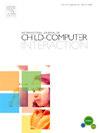一篇半系统的文献综述,旨在改善K-12教育中促进计算赋权的评估目标、实践和策略
Q1 Social Sciences
International Journal of Child-Computer Interaction
Pub Date : 2025-07-29
DOI:10.1016/j.ijcci.2025.100766
引用次数: 0
摘要
儿童计算机交互(CCI)研究显示出对计算赋权(CE)的兴趣越来越大,但仍然缺乏对可以证实其结果的评估实践的关注。本文提出了一项半系统的综述,以检查目前评估CCI中CE的方法,调查这些评估如何与学习活动联系起来,并提出改进CE评估的研究方向。我们的研究结果表明,大多数研究都是在正规的教育环境中进行的,主要目的是评估所提出的技术或学习模式,但往往只有有限的教育者参与。评估方法主要依赖于观察、反馈、反思和自我报告,但许多方法没有明确的理论框架。作为回应,我们提倡通过促进与教育工作者的可持续合作,将参与式设计重新引入电子教育。我们建议在示范研究的基础上,重点关注与学习设计支柱相一致的三个关键领域,以加强环境教育评估实践:(1)完善和推进环境教育学习目标;(2)将学习理论融入评估设计;(3)开展基于形成性评估原则的活动。本文章由计算机程序翻译,如有差异,请以英文原文为准。
A semi-systematic literature review for improving assessment goals, practices, and strategies for promoting computational empowerment in K-12 education
Child-Computer Interaction (CCI) research has shown growing interest in Computational Empowerment (CE), yet there remains a lack of focus on assessment practices that can substantiate its outcomes. This paper presents a semi-systematic review to examine current approaches to assessing CE in CCI, investigate how these assessments connect to learning activities, and propose research directions for improving CE assessments. Our findings reveal that most studies are situated in formal educational settings and primarily aim to evaluate proposed technologies or learning models, but often with limited educator involvement. Assessment methods primarily rely on observations, feedback, reflection, and self-reports, but many do not specify theoretical frameworks. In response, we advocate for recentering participatory design in CE by fostering sustainable collaboration with educators. We propose strengthening CE assessment practices by building upon exemplary studies and focusing on three key areas aligned with the pillars of learning design: (1) refining and advancing CE learning goals, (2) integrating learning theories into assessment design, and (3) developing activities grounded in formative assessment principles.
求助全文
通过发布文献求助,成功后即可免费获取论文全文。
去求助
来源期刊

International Journal of Child-Computer Interaction
Social Sciences-Education
CiteScore
7.20
自引率
0.00%
发文量
73
 求助内容:
求助内容: 应助结果提醒方式:
应助结果提醒方式:


